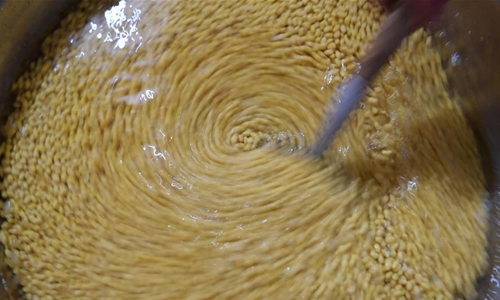China’s soybean inventory adequate despite pandemic

A villager soaks the soybeans at a workshop in Baiyang Town of Lichuan City, central China's Hubei Province, January 12, 2020. Baiyang dried bean curd is a well-known product in Baiyang Town for its delicate taste and elaborated making procedures. So far there are over 400 factories and workshops making Baiyang dried bean curd here which help the locals to shake off poverty and increase incomes. Photo: Xinhua
Uncertainty caused by the novel coronavirus in the US and elsewhere in the world is clouding soybean planting, and the implementation of the first phase trade deal between China and the US.
China wants to implement the agreement, but there is rising pressure, said Sang Baichuan, director of the Institute of International Business at the University of International Business and Economics and a trade advisor to Chinese government, told the Global Times on Tuesday.
"China has effectively contained the outbreak now, but the spread in the US and other soybean exporting countries such as Brazil seems to be intensifying, and this uncertainty will impact Chinese imports," Sang noted.
Argentina, the world's third-largest soybean exporter, announced a national lockdown from March 20 to 31. Brazil, a major food exporter, may impose a lockdown later. And, the ongoing outbreak in the US has cast shadows over the global soybean market.
Jim Sutter, CEO of the US Soybean Export Council, told the Global Times Sunday that the group is closely monitoring ongoing virus developments and assessing potential impact on US soy demand in China.
"As we head into harvest season, we anticipate that the purchase agreements reached in the phase one trade deal will be honored," Sutter said.
Sutter said the US is the top soybean exporter to China in the fall season as American farmers harvest their crops. However, during this spring-summer time window, there remain ample US soy reserves.
"It's important to note that when we began this marketing year starting September 1, 2019, we had a record high level of stocks in the US resulting from the trade war. Now we have good levels of soybean stocks in the US," Sutter said.
Sutter said that the virus-caused public health issue adds to global uncertainty. "Each farming season is different, and every year comes with different challenges. Farmers dealt with a number of challenges last season including flooding, wet weather, and an unpredictable market," he said.
The impact of the coronavirus pandemic will be more significant to exporters than importers, industry analyst said. Sang said that China's current soybean reserves should be able to meet market demand for three months.